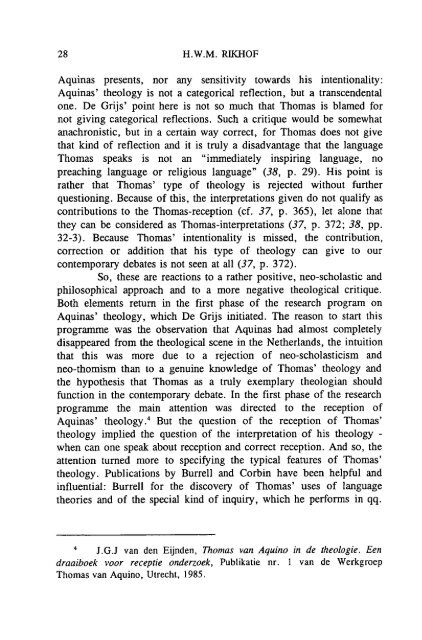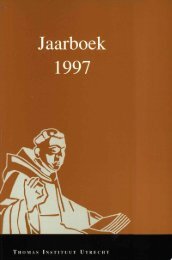Jaarboek Thomas Instituut 1995 - Thomas Instituut te Utrecht
Jaarboek Thomas Instituut 1995 - Thomas Instituut te Utrecht
Jaarboek Thomas Instituut 1995 - Thomas Instituut te Utrecht
Create successful ePaper yourself
Turn your PDF publications into a flip-book with our unique Google optimized e-Paper software.
28 H.W.M. RIKHOF<br />
Aquinas presents, nor any sensitivity towards his in<strong>te</strong>ntionality:<br />
Aquinas' theology is not a ca<strong>te</strong>gorical reflection, but a transcendental<br />
one. De Grijs' point here is not so much that <strong>Thomas</strong> is blamed for<br />
not giving ca<strong>te</strong>gorical reflections. Such a critique would be somewhat<br />
anachronistic, but in a certain way correct, for <strong>Thomas</strong> does not give<br />
that kind of reflection and it is truly a disadvantage that the language<br />
<strong>Thomas</strong> speaks is not an "immedia<strong>te</strong>ly inspiring language, no<br />
preaching language or religious language" (38, p. 29). His point is<br />
rather that <strong>Thomas</strong>' type of theology is rejec<strong>te</strong>d without further<br />
questioning. Because of this, the in<strong>te</strong>rpretations given do not qualify as<br />
contributions to the <strong>Thomas</strong>-reception (cf. 37, p. 365), let alone that<br />
they can be considered as <strong>Thomas</strong>-in<strong>te</strong>rpretations (37, p. 372; 38, pp.<br />
32-3). Because <strong>Thomas</strong>' in<strong>te</strong>ntionality is missed, the contribution,<br />
correction or addition that his type of theology can give to our<br />
con<strong>te</strong>mporary deba<strong>te</strong>s is not seen at all (37, p. 372).<br />
So, these are reactions to a rather positive, neo-scholastic and<br />
philosophical approach and to a more negative theological critique.<br />
Both elements return in the first phase of the research program on<br />
Aquinas' theology, which De Grijs initia<strong>te</strong>d. The reason to start this<br />
programme was the observation that Aquinas had almost comple<strong>te</strong>ly<br />
disappeared from the theological scene in the Netherlands, the intuition<br />
that this was more due to a rejection of neo-scholasticism and<br />
neo-thomism than to a genuine knowledge of <strong>Thomas</strong>' theology and<br />
the hypothesis that <strong>Thomas</strong> as a truly exemplary theologian should<br />
function in the con<strong>te</strong>mporary deba<strong>te</strong>. In the first phase of the research<br />
programme the main at<strong>te</strong>ntion was direc<strong>te</strong>d to the reception of<br />
Aquinas' theology." But the question of the reception of <strong>Thomas</strong>'<br />
theology implied the question of the in<strong>te</strong>rpretation of his theology -<br />
when can one speak about reception and correct reception. And so, the<br />
at<strong>te</strong>ntion turned more to specifying the typical features of <strong>Thomas</strong>'<br />
theology. Publications by Burrell and Corbin have been helpful and<br />
influential: Burrell for the discovery of <strong>Thomas</strong>' uses of language<br />
theories and of the special kind of inquiry, which he performs in qq.<br />
J.G.J van den Eijnden, <strong>Thomas</strong> van Aquino in de theologie. Een<br />
draaiboek voor receptie onderzoek, Publikatie nr. I van de Werkgroep<br />
<strong>Thomas</strong> van Aquino, <strong>Utrecht</strong>, 1985.








